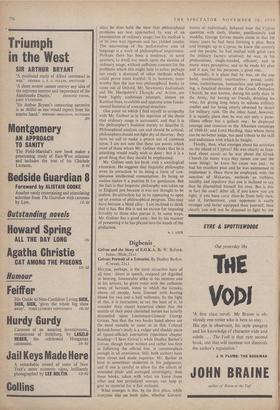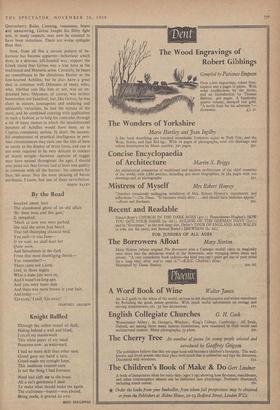Dighen is
Grivas: Portrait of a Terrorist. By Dudley Barker. (Cresset, 21s.) Grivas: Portrait of a Terrorist. By Dudley Barker. (Cresset, 21s.) HECTOR, perhaps, is the most attractive hero of all time: direct in speech, resigned yet dignified in bearing, honourable alike in his motives and in his actions, he gives voice with the authentic tones of heroism, tones to which the Greeks, above all people, have listened with beating blood for two and a half millennia. In the light of this, it is instructive, to say the least of it, to consider their recent hysterical claim that the mantle of their most cherished heroes has latterly descended upon Lieutenant-General George ' Grivas. Not that the two books listed above are the most suitable to assist us in this. Colonel Byford-Jones's study is a vulgar and shoddy piece of (quasi-official) journalism (specimen chapter heading—'1 Save Grivas'); while Dudley Barker's Grivas, though better written and rather less firm in following the official line, is commonplace enough in all conscience. Still, both authors have been about and made inquiries; Mr. Barker at least is sometimes moderate in his judgments; and if one is careful to allow for the effects of wounded pride and outraged sovereignty, then these books, taken with what we know from other and less prejudiced sources, can help to give us material for a fair estimate.
What emerges is this. In the first place, while everyone else on both sides, whether Govern- ments or individuals, behaved over the Cyprus question with sloth, bluster, pusillanimity and muddle, George Grivas stands alone in that for many years he had been forming a plan. Born and brought up in Cyprus, he knew the country and the people; he had studied with great care the military factors involved; he was, in his preparations, single-minded, efficient, and in many ways perceptive; and so he made his plan and it was, for his purposes, a good one.
Secondly, it is plain that he was, on the one hand, inordinately unattractive: proud, ambi- tious, authoritarian, humourless and self-regard- ing, a fanatical devotee of the Greek Orthodox Church, he was known, during his early days in the Army, for having no friends, drinking no wine, for giving long hours to tedious military studies and for being utterly obsessed by desire for military rank. On the other hand, however, it is equally plain that he was not only a punc- tilious officer but a gallant one: he displayed courage and resource in the Albanian campaign of 1940-41; and Lord Harding, than whom there can be no better judge, has paid tribute to the skill and endurance with which he fought.
Thirdly, then, what emerges about his activities on the island of Cyprus? He was clearly as fana- tical about enosis as he was about the Greek Church (in many ways they meant one and the same thing): he knew his cause was just : he had his excellent plan and he was summoned to implement it. Once there he employed, with the sanction of Makarios, methods so ruthless, stealthy and repulsive that one is inclined to say that he discredited himself for ever. But is this in fact the case? After all, if you know you are right, if you have carte blanche from holy men, and if, furthermore, your opponent is vastly stronger and better equipped than yourself, then clearly you will not be disposed to fight by the
Queensberry Rules. Cunning, venomous, brave and unwavering, Grivas fought his filthy fight and, in many respects, may now be counted to have been victorious. There are worse epitaphs than that.
Now, from all this a certain pattern of be- haviour has become apparent—behaviour which does, in a devious, left-handed way, support the Greek claim that Grivas was a true hero in the traditional and Homeric sense. Certainly, he bears no resemblance to the chivalrous Hector or the lion-hearted Achilles; but he does have a great deal in common with Odysseus of many wiles, who, whether you like him or not, was an un- doubted hero. Odysseus, of course, was neither humourless nor fanatical; but, like Grivas, he was short in stature, courageous and enduring and ultimately victorious, he had the slyness of the stoat, and he combined cunning with application in such a fashion as to help his comrades through a lot of nasty messes in which the unadulterated heroism of Achilles would have been, as in Cyprus, completely useless. In short, the success- ful employment of practical intelligence in peri- lous circumstances may earn one the title of hero as surely as the display of brute force, and one is not even required to be very delicate in matters of moral scruple—however captains of rugger may have opined throughout the ages. I should also point out that Grivas had at least one quality in common with all the heroes : his concern for face. his ureic. Not the most pleasing of heroic attributes, 1 know, but one of them nevertheless.
SIMON RAVEN







































































 Previous page
Previous page